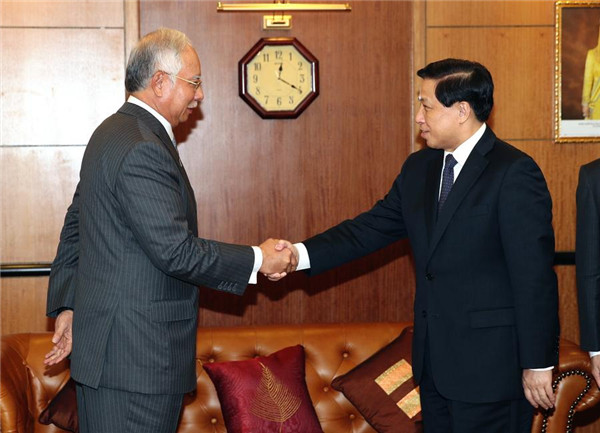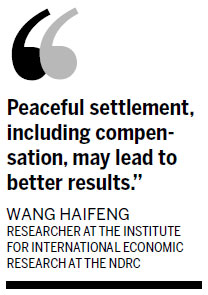MH370 'unlikely' to hurt long-term Sino-Malaysian ties
Updated: 2014-04-02 08:05
By Li Jiabao and Zhao Yanrong (China Daily)
|
|||||||||||
| Latest News | Search effort | Families' reaction | Timeline | Reporter's log |
| Infographic | Doubts | Airlines' statement | Photos | China's perspective |
 |
|
Chinese special envoy Zhang Yesui met with Malaysian Prime Minister Najib Razak to discuss the flight's disappearance and apparent crashing, on March 26, 2014. [Photo/Xinhua] |
Long-term cooperation between China and Malaysia is unlikely to be affected by missing Malaysia Airlines flight MH370, observers say, urging a rational, calm attitude for people and organizations of the two countries.
On March 8, the Beijing-bound Boeing 777, carrying 239 people, including 154 Chinese and 52 Malaysians, disappeared not long after its takeoff from Kuala Lumpur.
|
 |
They also challenged Malaysian Prime Minister Najib Razak's abrupt announcement on March 24 that the flight had "ended" in the southern Indian Ocean.
Some Chinese celebrities even said in online postings that they will boycott Malaysia because of "false" information and "lack of respect for the lives of Chinese passengers".
On the other hand, Malaysian organizations, media and Web users accuse some Chinese of being ungrateful for the efforts Malaysia has made.
In a statement on Friday, the Associated Chinese Chambers of Commerce and Industry of Malaysia accused the Chinese media and celebrities of spreading false information based on speculation that has hurt the passengers' families and damaged relations between the peoples of the two countries.
It also cited the strong political, economic and cultural ties between the two countries and the generous donations made by Malaysian Chinese. It called on families and public figures alike to calm down and show understanding.

Wang Haifeng, a researcher at the Institute for International Economic Research at the National Development and Reform Commission (NDRC), said that "the missing flight accident, to some extent, was out of the control of the Malaysian government owing to subjective and objective limitations".
The way the government addressed the accident revealed a "chasm" between it and "the expectations of Chinese relatives", and it became a target of "people lashing out in cyberspace", Wang said.
Wang urged netizens and the media to show restraint and remain rational as Malaysia, a developing economy, has "limited experience in addressing a crisis of this kind".
"Peaceful settlement, including compensation, may lead to better results," Wang said.
"The Chinese government also wants healthy economic development to continue, and cooperation on trade, investment and finance are unlikely to be hurt."
Jia Duqiang, a researcher with the same institution, said: "Before the aircraft accident, the relationship between China and Malaysia was good. Regardless of some disagreements over certain water in the South China Sea, the economic and political ties were stable.
"Certain actions from the Malaysian side, especially the late news releases, really triggered anger from the Chinese people, particularly the passengers' families. That is understandable, I think."
Wang noted that Malaysia's economy has been stable, and its investment environment has been the best among the Association of Southeast Asian Nations. In addition, China and Malaysia share solid foundations in economic and political cooperation as well as culture exchanges.
Zhou Xiaobing, a researcher at the National Institute of International Strategy, added that China's trade and economic cooperation with Malaysia has been robust and "will remain positive in the future".
Contact the writers at lijiabao@chinadaily.com.cn and zhaoyanrong@chinadaily.com.cn.
Related Stories
Last words from cockpit: 'Goodnight Malaysian 370' 2014-04-01 10:17
China rules out 11 locations in missing jet search 2014-04-01 19:09
Search for missing Malaysian jet ends with no substantive findings 2014-03-30 10:17
Families mull lawsuits over missing plane 2014-03-28 06:53
Today's Top News
Nation's vitality 'a chance for all'
China rules out 11 locations in missing jet search
Transcript of MH370 pilot communications
MH370 'unlikely' to hurt long-term Sino-Malaysian ties
Manila wrong to force arbitration: Chinese diplomat
Four Thai protesters shot, injured
US envoy in India resigns
Xi's trip builds bridge to Europe
Hot Topics
Lunar probe , China growth forecasts, Emission rules get tougher, China seen through 'colored lens', International board,
Editor's Picks

|

|

|

|

|

|





